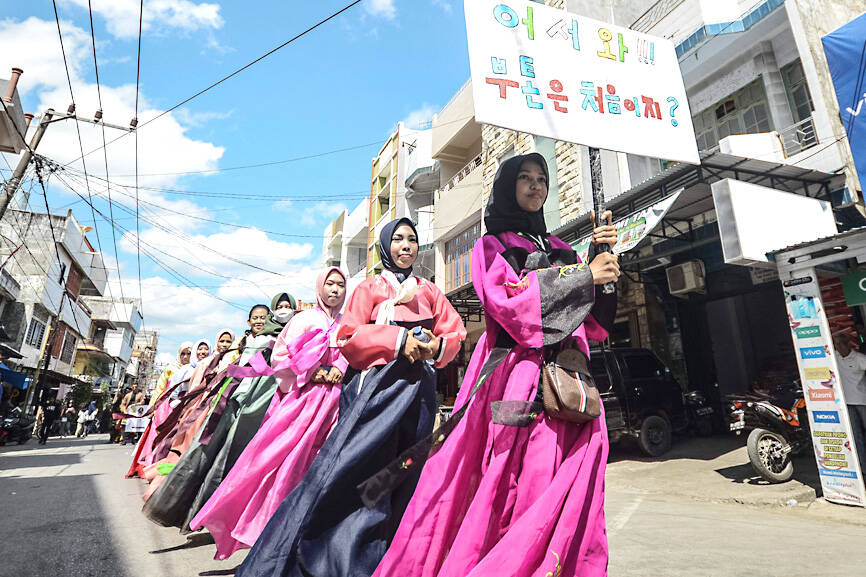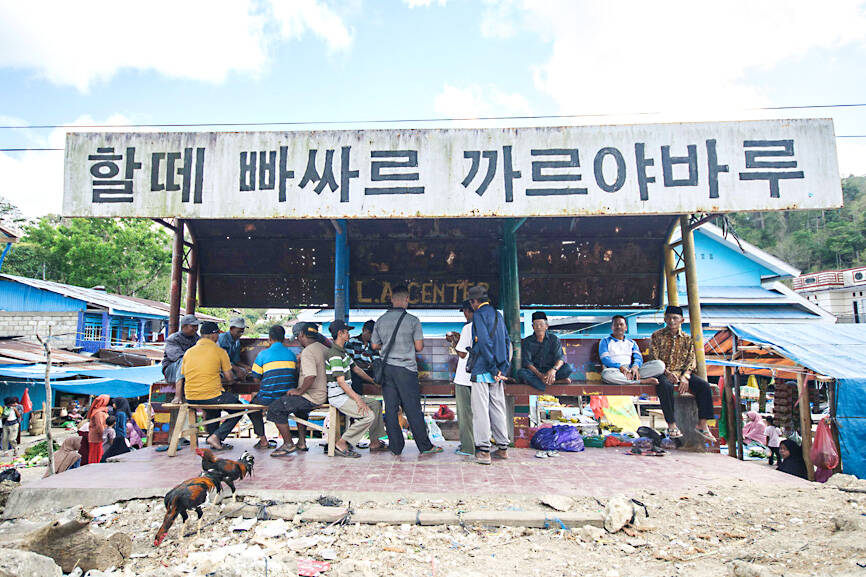In an eastern Indonesian village, schoolchildren scrawl the distinctive circles and lines of Hangul script on a whiteboard, but the language they are learning is not Korean — it is their own indigenous Cia-Cia tongue.
The language of the Cia-Cia ethnic group in southeast Sulawesi Province’s Baubau has no written form and the syllable-based tongue does not readily translate to the Latin alphabet often used to transcribe Indonesia’s national language.
However, the Korean Hangul script, developed in the 15th century, shares a syllable-based system that has made it an unusual tool in the effort to preserve and transmit the language of the approximately 80,000 Cia-Cia people.

Photo: AFP
“In Latin words, for instance, there’s no agreed way to pronounce the sounds ‘pha’ or ‘ta,’ but after I learned Korean, it turns out there are Korean characters for the sounds,” said 48-year-old teacher Abidin, who goes by one name. “They are not exactly the same, but they’re similar.”
Indonesia is a vast archipelago nation with myriad tribes and cultures that boasts more than 700 unique languages, making it one of the most linguistically diverse nations in the world.
The country’s official language is Bahasa Indonesia, which owes its standard written form using Latin letters to Dutch colonial rule.

Photo: AFP
However, the Cia-Cia’s language had no surviving written form until 2009, when Hangul was introduced after a cultural exchange between Baubau city and South Korean academics.
The decision was the outcome of a concerted push by South Korean linguists, who visited to tout Hangul’s sound-based system as the perfect fit.
After the visit, the city sent teachers and students to South Korea to learn Hangul with the goal of developing a standard way to write and teach their language.
In ancient times, leaders of the community committed the language to scraps of paper and wood using non-standard symbols that were never passed down and withered away.
However, today Cia-Cia names dot the city’s schools, streets and government institutions, rendered in Hangul.
The tongue is also taught to students from elementary to high school using Hangul symbols, although it remains largely a spoken rather than written language.
Abidin spent six months in South Korea training on Hangul and is seen as a pioneer of transcribing Cia-Cia in the script. He has even penned a dictionary for the language using Hangul.
Hangul is viewed with great pride in South Korea, where it was once banned under Japanese rule, and word of the script’s role in Indonesia has been hailed by some politicians and newspapers as proof of the writing system’s global presence.
Its adoption by the Cia-Cia illustrated a fierce desire to preserve their language, said Dalan Mehuli Perangin-angin, a linguist at Indonesia’s Sanata Dharma University.
“This shows that there is a longing from the people for their own script,” he said.
Even the spoken form of Cia-Cia faces pressure from the dominance of Bahasa Indonesia and other regional languages, said Ilyas, a local elder, who goes by one name.
“Many words have been lost due to the influence of Indonesian and other regional languages. This has been happening for about 20 years,” the 50-year-old said.
Fears about their language’s future prompted elders to accept the use of Hangul, but some do have concerns.
Baubau is the only place in Indonesia to use Hangul, and while the South Korean push for the script is not backed by Seoul, its nationalist tint could blur the community’s identity, Periangin-angin said.
“Language contains memories, history, morality and wisdom of our ancestors. A language script is a legacy,” he said.
He suggests the Cia-Cia could have adopted a script already used by another language in Sulawesi, which would have had closer linguistic links.
However, for Sarianto, who was among the students who learned Hangul in South Korea, the script has “sparked the creation of new discourses dedicated to the preservation of the Cia-Cia language.”
“Before the introduction of Hangul, many of Cia-Cia people used to feel a bit hesitant about using the local language in formal settings,” he said. “However, with the implementation of Hangul, people say our Cia-Cia language has become global.”

‘EYE FOR AN EYE’: Two of the men were shot by a male relative of the victims, whose families turned down the opportunity to offer them amnesty, the Supreme Court said Four men were yesterday publicly executed in Afghanistan, the Supreme Court said, the highest number of executions to be carried out in one day since the Taliban’s return to power. The executions in three separate provinces brought to 10 the number of men publicly put to death since 2021, according to an Agence France-Presse tally. Public executions were common during the Taliban’s first rule from 1996 to 2001, with most of them carried out publicly in sports stadiums. Two men were shot around six or seven times by a male relative of the victims in front of spectators in Qala-i-Naw, the center

Canadian Prime Minister Mark Carney is leaning into his banking background as his country fights a trade war with the US, but his financial ties have also made him a target for conspiracy theories. Incorporating tropes familiar to followers of the far-right QAnon movement, conspiratorial social media posts about the Liberal leader have surged ahead of the country’s April 28 election. Posts range from false claims he recited a “satanic chant” at a campaign event to artificial intelligence (AI)-generated images of him in a pool with convicted sex offender Jeffrey Epstein. “He’s the ideal person to be targeted here, for sure, due to

Australia’s opposition party yesterday withdrew election promises to prevent public servants from working from home and to slash more than one in five federal public-sector jobs. Opposition leader Peter Dutton announced his conservative Liberal Party had dropped its pledge that public servants would be required to work in their offices five days a week except in exceptional circumstances. “I think we made a mistake in relation to this policy,” Dutton told Nine Network television. “I think it’s important that we say that and recognize it, and our intention was to make sure that where taxpayers are working hard and their money is

DISPUTE: Beijing seeks global support against Trump’s tariffs, but many governments remain hesitant to align, including India, ASEAN countries and Australia China is reaching out to other nations as the US layers on more tariffs, in what appears to be an attempt by Beijing to form a united front to compel Washington to retreat. Days into the effort, it is meeting only partial success from countries unwilling to ally with the main target of US President Donald Trump’s trade war. Facing the cratering of global markets, Trump on Wednesday backed off his tariffs on most nations for 90 days, saying countries were lining up to negotiate more favorable conditions. China has refused to seek talks, saying the US was insincere and that it